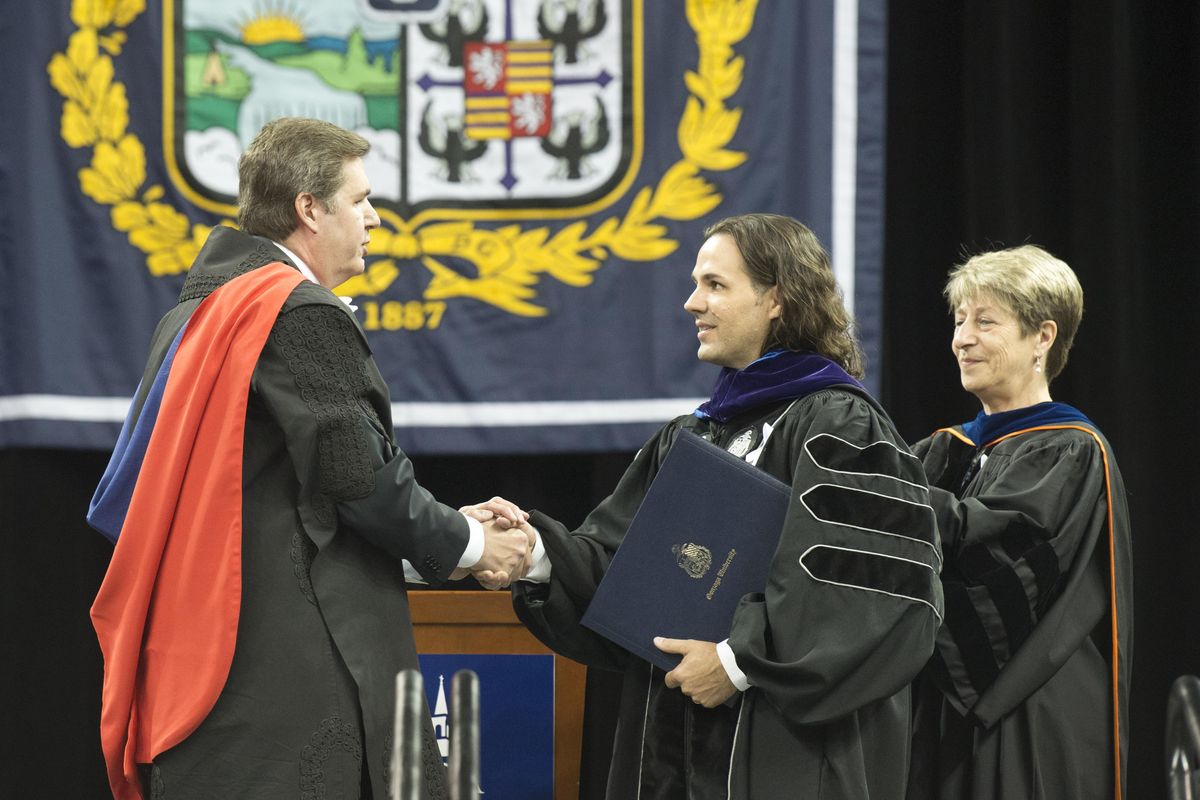Justice, mission and choice: Mercy Corps mission director offers words of advice at Gonzaga commencement

To the roughly 1,000 young and smiling faces anchoring the room, Andrew Dwonch confessed the life he built as an accomplished humanitarian was a happy accident.
Indifferent, and at times apathetic, Dwonch was a sophomore at Gonzaga University in 1997, when he met a priest in Florence, Italy, while studying abroad one semester who changed his life. “Don’t get aggro, bro,” the priest would tell him, before spinning a record of the Rolling Stones’ song “You Can’t Always Get What You Want.”
The lesson struck a chord, but didn’t sink in until months later, when he was bicycling through a small Egyptian town and happened upon a group of impoverished boys animated by the mere sight of something foreign.
“The poverty I had seen before on TV always looked so sad and hopeless,” he told the crowd of students and their family members in the packed Spokane Veterans Memorial Arena. “My observation that day was a bit naive, but in that moment I wondered, if these boys can be overjoyed with something so simple, then why, with what I had going for me, could I be so dissatisfied?”
It was an “aha moment,” he said. “I was awestruck.”
Dwonch, the mission director for Mercy Corps in Palestine, delivered the keynote address for Gonzaga’s 1,070 students at the undergraduate commencement ceremony Sunday morning.
For about 30 minutes, he led students through the events and decisions that guided him to a life of humanitarian work, including managing more than 250 community infrastructure projects in Albania, Serbia, Iraq and Lebanon in the early 2000s, where he built schools, roads, bridges, community centers, health clinics and water systems for vulnerable communities.
In 2006, he returned to the conflicts in the Middle East, where he started working with Mercy Corps, a global nongovernmental humanitarian aid organization. As the current mission director in Palestine, he has provided food, clean drinking water and financial assistance, and he inspired graduating seniors in Gaza by helping the technology economy with startups in partnership with Google.
But all of that, he said from the podium, was because he opened his eyes after meeting that group of 7- and 8-year-old boys.
“Instead of looking for my next destination, I was looking around more often,” he said. “Work has taken on new meaning because I now see how interconnected our world is.”
In imparting his wisdom to the students who would soon grapple with the difficulties of adulthood, Dwonch shared three beliefs that he said were “deeply held” and cultivated while at Gonzaga, where he ended up graduating in 1999 with a degree in engineering.
The first was a need for social justice in the world. The second, a personal mission to constantly adapt and remain open. And third and finally, his belief in the power of choice; the autonomy people have to choose their own path in life, especially graduates of Gonzaga.
“I hope that when you step off the stage today and into the next chapter of your lives, that each of you will do your best to unleash your power,” he said. “For all of us and for generations to come.”